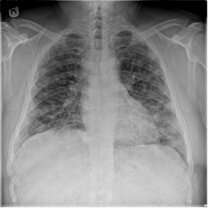New imaging resource assists AI in the COVID-19 fight

Published today in the Open-Access, Open-Data journal GigaScience is the National COVID-19 Chest Imaging Database (NCCID), a centralized database containing chest X-rays, Computed Tomography (CT) and MRI scans from patients across the UK. Utilizing the unique position as the world's single largest integrated healthcare system, the benefits of collecting chest imaging data this large are extensive and already being used by doctors and the research community. The database is already supporting the development of Artificial Intelligence (AI)-powered image processing software and diagnostic products and models being used to predict COVID-19 mortality in the UK. And also has the potential to become a long-term resource for teaching radiologists. These efforts provide the potential to enable faster patient assessment in Accident and Emergency, save clinicians time, and increase the safety and consistency of care across the UK.
With the GigaScience paper describing how to access this Open Data resource, the NCCID training data is available to users anywhere in the world, including software developers, academics and clinicians, via a rigorous Data Access Request process. The National Covid Chest Imaging Database (NCCID) is one of the largest datasets of its kind and it is continuously growing, with 25 NHS trusts and over 25 NHS trusts and 27 hospitals contributing. Collecting imaging data from over 10,000 patients in the NCCID training set to make available 34,559 image studies and 1,663GB of data.
Collected with the aim of supporting a better understanding of the COVID-19 virus and develop technology which will enable the best care for patients hospitalized with a severe infection. It is an initiative established by NHSX, the new UK Government unit with responsibility for setting national policy and developing best practice for the National Health Service (NHS) technology, digital and data, including data sharing and transparency. This represents a country-wide effort from radiologists and IT teams in NHS sites, the British Society of Thoracic Imaging (BSTI), Royal Surrey County Hospital (RSCH) and the NHS AI Lab have collaborated at a time where all teams have had little capacity for long-term projects.
Asked on the utility of this work, first author Dominic Cushnan says that "the NCCID database facilitates the creation of AI-enabled diagnostic tools which can augment and accelerate the clinical diagnosis of diseases (such as COVID) and also support longitudinal studies on the effect of disease on patients and population management"
This data has already been used by a number of projects and studies, such as the LUCAS tool developed to predict Covid patient mortality risk from patient variables. As well as a number of artificial intelligence powered models and algorithms to support doctors to decide what action to take on the front-line, such as giving oxygen and medications, before patients reach a critical stage. The Cambridge University NHS AIX-COVNET collaboration being one of the first projects to utilize this data to develop an open-source AI tool to support the rapid diagnosing and triaging of patients with COVID-19.
More information: Cushnan D, et al, An overview of the National COVID-19 Chest Imaging Database: data quality and cohort analysis, Gigascience (2021). DOI: 10.1093/gigascience/giab076
Github: nhsx.github.io/covid-chest-imaging-database/





















